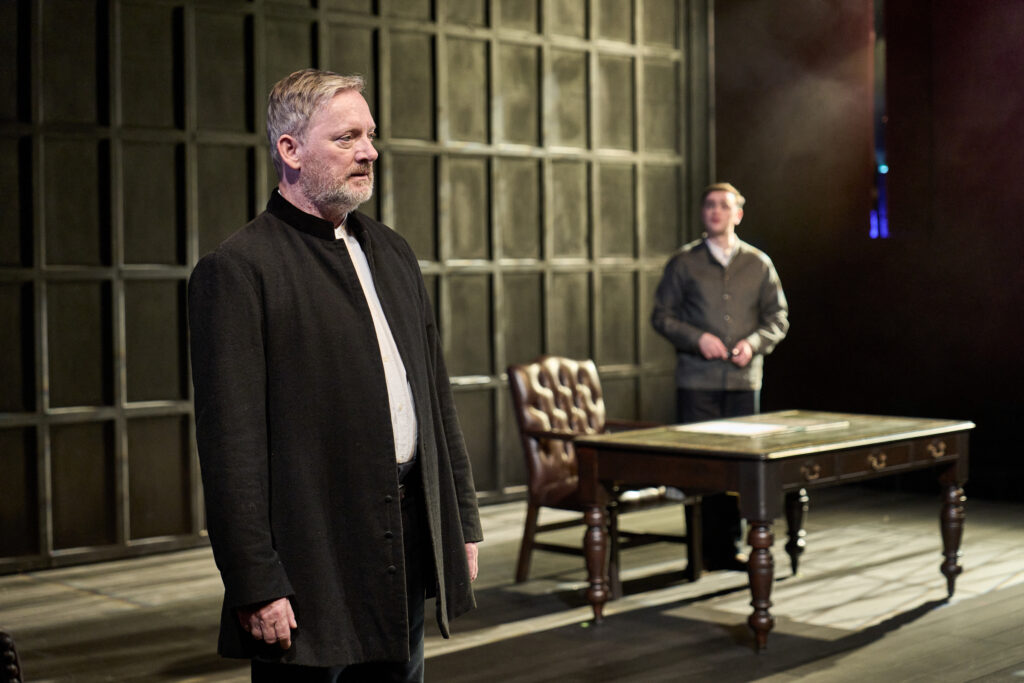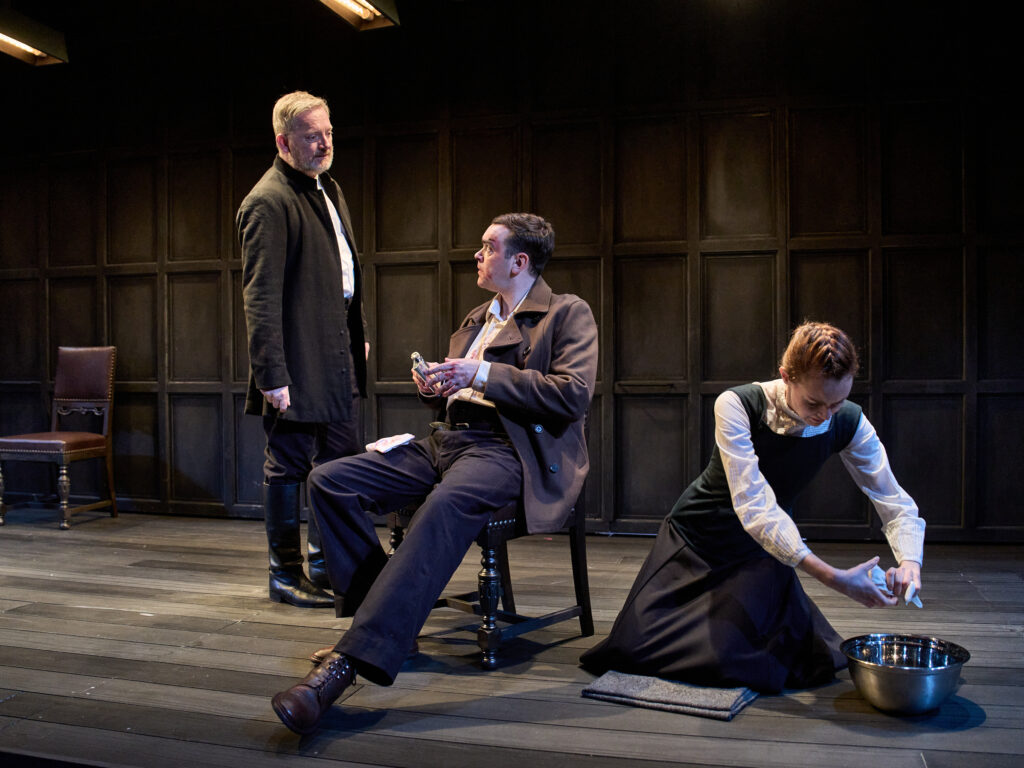★★★★★
This thrilling drama is about the men who surrounded her, exploited her and decided her fate. One is Sir James Melville, a real historical figure, who is the central character of this play. Inspired by a muscular, vigorous script, Douglas Henshall, of Shetland fame, gives a towering performance as an apparently good man, who gave her his support, but ultimately has both his conscience and his loyalty tested.
Mary is part of a series of plays that Rona Munro is writing about the Scottish Stewart monarchy before it amalgamated with the English crown (when James VI of Scotland became James I of England).Unlike the Shakespeare history style of the so-called James Plays, Mary is essentially a three hander but- and this says a lot- Mary Queen Of Scots isn’t one of those three. In fact she hardly makes an appearance.
Yet by the end, you understand a great deal about Mary annd about the position of women in 16th century society, even a queen. When I say 16th century, the script says it’s set in 1581 ‘but it could be any time’. You may not see much of Mary but by the end I think you will feel very sorry for her and shocked by how she was treated.
Ashley Martin-Davis’s set creates the mood perfectly. The back of the stage is filled with wood panelling, the doors invisible until they open. So, it’s very claustrophobic but also quite neutral in terms of the era. Matt Haskins’ lighting design suggests the sun feebly penetraying the darkness of the castle.
The costumes are also not pinned to the 16th century and, in their simplicity, could easily be worn today. In fact, I’m pretty sure I saw Jimmy Perez wearing something similar. The language is contemporary, not cod Shakespearean. All reinforce the idea that what happened to Mary as a woman could happen today, even to a powerful woman.
We begin with John Thompson, lying bloodied on the ground. He’s been beaten up by the powerful but nasty Bothwell. Sir James enters. He has known and served the Queen since her childhood.He’s an authoritative figure, knows his way around court, is confident he can see problems and solve them. He wants to get Thompson cleaned up because he doesn’t want the Queen to see the blood, since that will upset her. From this, we see he is patronisingly protective. He tries to persuade Thompson to help the Queen escape the castle and the clutches of Bothwell- someone else we never meet.
Thompson is ambitious and wants to be sure he chooses the right side. Brian Vernel is a great choice for the part. In the course of the play, we see this weasel of a man change from subservient to dominant without ever losing the sense of his cowardly pragmatism.
Also in the room is a servant, Agnes, played by Rona Morison with an appropriate fire in her belly. Like Thompson, she is a made-up character. It may need a stretch of the imagination to think she could get away with speaking so forthrightly to these men- both of them do express their frustration with her- but she is important to the play, both to show the power and fanaticism of the Protestant faith at that time and therefore the suspicion of the catholic Mary, but also because she gives a woman’s perspective on this man’s world.
In the second act, everything has changed. The Queen is on the verge of being overthrown, Thompson is on the rise, and Melville is adrift and less powerful. The conversation between the two, with interventions from Agnes, is thrilling, as Thompson tries to persuade him to stand against the Queen by wheedling and questioning like a prosecution lawyer. Melville’s previously professed love of the Queen is tested and his defence of his actions becomes increasingly shaky. Did he really love her or was it the power of her he loved? Did he use her or try to use her just as much as the other powerful men around her?
Douglas Henshall is phenomenally good in this role. If you’ve watched him in Shetland on TV, you’ll know how his portrayal of detective Jimmy Perez lifted the series from the ordinary to something special. Here, as his character struggles to keep his belief in himself, tries in vain to assert his authority, faces a most difficult challenge to his conscience, Douglas Henshall’s performance, moving from confident to hectoring to desperate, is a tour de force.
It’s a triumph too for Roxana Silbert, Hampstead Theatre’s Artistic Director, who directs this tight, tense production.
Keeping Mary off the stage is a masterstroke by Rona Munro because this play is about how powerful men use her to their own ends. So she becomes a blank sheet of paper and what we learn about her is entirely what is written on it by the men, and at the end by Agnes. And what we learn is that she was badly advised, including by Melville, was given no choice but to make bad decisions, and in a shocking revelation which I won’t spoil, was physically powerless against their violence.
It is possible that Rona Munro also intends the Queen to be a metaphor for Scotland the country and the way politicians and landowners have treated it.
I would love to think that things have changed in 400 years, and perhaps they have in terms of women standing up for themselves and each other (and plenty of men supporting them). However there are still many men, some powerful, who continue every day to use and abuse women.
This powerful play is far more than a lesson in history.
Mary is running at Hampstead Theatre until 26 November 2022.
Paul was given a press ticket by the theatre.

